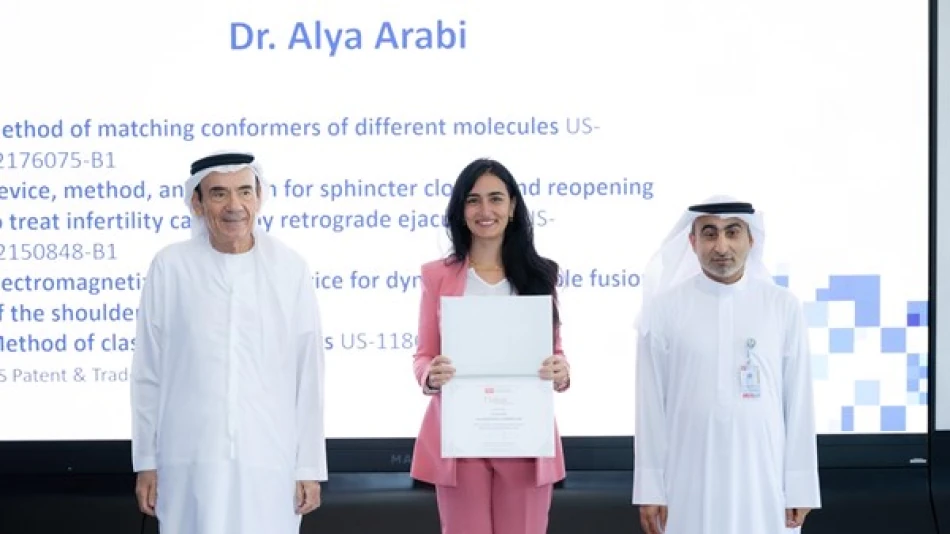
Emirati Researcher Secures Groundbreaking Drug and Medical Device Patents
UAE University Researcher Secures Four Patents That Could Transform Drug Discovery and Medical Treatment
Dr. Alya Arabi, a computing researcher at the United Arab Emirates University, has secured four groundbreaking patents that bridge artificial intelligence, quantum computing, and medical innovation. Her work promises to accelerate drug discovery processes while offering new solutions for complex medical conditions including complete shoulder paralysis and male fertility issues—positioning the UAE as an emerging hub for medical technology innovation.
Revolutionary Drug Discovery Through Computational Intelligence
Two of Dr. Arabi's patents focus on transforming how pharmaceutical companies approach drug development. The first patent introduces a technique for classifying molecular isomers based on their interaction with human proteins, while the second provides an efficient tool for matching isomers between different molecules, enabling similar interactions with biological proteins.
This computational approach represents a significant departure from traditional drug discovery methods. By reducing reliance on expensive laboratory experiments, these innovations could cut drug development timelines from decades to years, potentially saving pharmaceutical companies billions in research costs while bringing life-saving treatments to market faster.
Market Impact on Pharmaceutical Innovation
The global drug discovery market, valued at over $70 billion annually, has long struggled with high failure rates and extended development cycles. Dr. Arabi's computational methods align with industry trends toward AI-driven drug discovery, similar to initiatives by companies like DeepMind and partnerships between tech giants and pharmaceutical corporations.
For the UAE, this positions the country alongside Singapore and Israel as a regional leader in biotech innovation, supporting the nation's economic diversification goals beyond oil dependency.
Medical Device Breakthroughs Address Complex Conditions
The third patent, developed in collaboration with Professor Basem Al-Hassan from Massachusetts General Hospital (Harvard Medical School), represents a quantum leap in orthopedic medicine. The innovative device enables patients with complete shoulder paralysis to regain full range of motion—something previously considered impossible in extreme cases.
This breakthrough could transform rehabilitation medicine, offering hope to stroke patients, spinal cord injury survivors, and those with degenerative neurological conditions. The collaboration with Harvard also demonstrates the UAE's growing integration into global medical research networks.
Dual-Function Solution for Reproductive and Urological Health
The fourth patent addresses two common but challenging health issues: male infertility caused by retrograde ejaculation and urinary incontinence. This dual-function biomedical device represents an advanced step in reproductive health and urology, potentially offering more effective treatment options than current single-purpose solutions.
The convergence of multiple medical applications in one device reflects a broader trend toward integrated healthcare solutions, reducing patient burden while improving treatment outcomes.
Strategic Implications for UAE's Innovation Economy
Dr. Arabi's achievements reflect the UAE's broader strategy to become a knowledge-based economy. The country has invested heavily in research infrastructure, established free zones for biotech companies, and created regulatory frameworks to support medical innovation.
These patents could attract international pharmaceutical companies to establish research centers in the UAE, similar to how Singapore became a regional biotech hub through strategic government investment and research excellence.
The Commercialization Challenge
While the patents represent significant scientific achievements, their true impact will depend on successful commercialization. Dr. Arabi acknowledges this challenge, noting that transforming prototypes into practical, market-ready products remains the next critical step.
The UAE's growing venture capital ecosystem and government support for technology transfer could provide the necessary bridge between academic research and commercial application. Success in this area would establish the country as not just a research destination, but a complete innovation ecosystem capable of bringing breakthrough medical technologies to global markets.
For investors and healthcare companies, these developments signal the UAE's emergence as a serious player in medical technology innovation, potentially offering new opportunities for partnerships and market expansion in the Middle East and beyond.
Most Viewed News

 Layla Al Mansoori
Layla Al Mansoori






